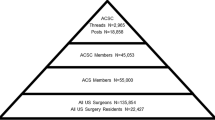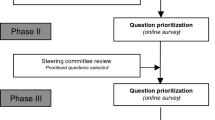Abstract
Background
Social media is a growing medium for disseminating information among surgeons. The International Hernia Collaboration Facebook Group (IHC) is a widely utilized social media platform to share ideas and advice on managing patients with hernia-related diseases. Our objective was to assess the safety and utility of advice provided.
Methods
Overall, 60 consecutive de-identified clinical threads were extracted from the IHC in reverse chronological order. A group of three hernia specialists evaluated all threads for unsafe posts, unhelpful comments, and if an established evidence-based management strategy was provided. Positive and negative controls for safe and unsafe answers were included in seven threads and reviewers were blinded to their presence. Reviewers were free to access all online and professional resources (except the IHC).
Results
There were 598 unique responses (median 10, 1–26 responses per thread) to the 60 clinical threads/scenarios. The review team correctly identified all seven positive and negative controls. Most responses were safe (96.6%) but some were unhelpful (28.4%). For sixteen threads, the reviewers believed there was an established evidence-based answer; however, only six were provided. In addition, 14 responses were considered unsafe, but only four were corrected.
Conclusions
The vast majority of responses were considered helpful; however, evidence-based management is typically not provided and unsafe recommendations often go uncontested. While the IHC allows wide dissemination of hernia-related surgical advice/discussions, surgeons should be cautious when using the IHC for clinical advice. Mechanisms to provide evidence-based management strategies and to identify unsafe advice are needed to improve quality within online forums and to prevent patient harm.
Similar content being viewed by others
References
Cherla DV, Moses ML, Viso CP et al (2018) Impact of abdominal wall hernias and repair on patient quality of life. World J Surg 42(1):19–25
HerniaSurge G (2018) International guidelines for groin hernia management. Hernia 22(1):1–165
Adilman R, Rajmohan Y, Brooks E et al (2016) Social media use among physicians and trainees: results of a national medical oncology physician survey. J Oncol Pract 12(1):79–80
Cheston CC, Flickinger TE, Chisolm MS (2013) Social media use in medical education: a systematic review. Acad Med 88:893–901
DeCamp M, Cunningham AM (2013) Social media: the way forward or a waste of time for physicians? J R Coll Phys Edinb 43(4):318–322
Collaboration IH (2018). International Hernia Collaboration Facebook Group. https://www.facebook.com/groups/herniacollab/. Accessed October 2017
Patricia C Chui M, Brian P Jacob, MD. Mount Sinai Medical Center, NYC. QUALITY IMPROVEMENT THROUGH SOCIAL MEDIA: AN INITIAL LOOK AT THE INTERNATIONAL HERNIA COLLABORATION FACEBOOK(TM) GROUP. 2014; https://www.sages.org/meetings/annual-meeting/abstracts-archive/quality-improvement-through-social-media-an-initial-look-at-the-international-hernia-collaboration-facebooktm-group/. Accessed September 2017
Bittner JGT, Logghe HJ, Kane ED et al (2019) A society of gastrointestinal and endoscopic surgeons (SAGES) statement on closed social media (Facebook(R)) groups for clinical education and consultation: issues of informed consent, patient privacy, and surgeon protection. Surg Endosc 33(1):1–7
Bittner JGT, Baghai M, Jacob BP (2019) Management of a primary ventral incisional hernia: a survey of the International Hernia Collaboration. J Robot Surg 25:4554. https://doi.org/10.1007/s11701-019-00940-3
Renton DB, Nau P, Wee DW (2017) The SAGES manual transitioning to practice. In: Renton DB, Nau P, Wee DW (eds) The SAGES manual transitioning to practice. Springer International Publishing, Library of Congress, p 160
George DR, Green MJ (2012) Beyond good and evil: exploring medical trainee use of social media. Teach Learn Med 24(2):155–157
Hajian-Tilaki K (2011) Sample size estimation in epidemiologic studies. Casp J Intern Med 2(4):289–298
Hamm MP, Chisholm A, Shulhan J et al (2013) Social media use by health care professionals and trainees: a scoping review. Acad Med: J Assoc Am Med Coll 88(9):1376–1383
Mary Modahl LT, Tracey Moorhead. Doctors, Patients & Social Media. 2011. http://www.quantiamd.com/q-qcp/social_media.pdf. Accessed June, 2018
Hammer MJ (2017) Ethical considerations when using social media for research. Oncol Nurs Forum 44(4):410–412
Steele SR, Arshad S, Bush R et al (2015) Social media is a necessary component of surgery practice. Surgery 158(3):857–862
Sterling M, Leung P, Wright D, Wright D, Bishop TF (2017) The use of social media in graduate medical education: a systematic review. Acad Med 92:1043–1056
Steele S, Adcock C, Steel A (2016) Ethical, legal and professional issues arising from social media coverage by UK helicopter emergency medical services. Emerg Med J. 33(1):57–60
Greene JA (2007) Pharmaceutical marketing research and the prescribing physician. Ann Intern Med 146(10):742–748
Giles J (2005) Internet encyclopaedias go head to head. Nature 438(7070):900–901
Funding
There was no funding received to conduct this study.
Author information
Authors and Affiliations
Consortia
Corresponding author
Ethics declarations
Disclosures
Drs. Hope and Roth received associated research funding from BD Inc. in the last 36 months, but this funding was not used to complete this study. Dr. Bernardi, Ms. Milton, Dr. Shah, Ms. Shah, Ms. Lyons, Dr. Martin, Dr. Holihan, Dr. Cherla, Dr. Ko, Dr. Hughes, and Dr. Liang have no conflict of interest or financial ties to disclose.
Additional information
Publisher's Note
Springer Nature remains neutral with regard to jurisdictional claims in published maps and institutional affiliations.
Rights and permissions
About this article
Cite this article
Bernardi, K., Milton, A.N., Hope, W. et al. Are online surgical discussion boards a safe and useful venue for surgeons to ask for advice? A review of the International Hernia Collaboration Facebook Group. Surg Endosc 34, 1285–1289 (2020). https://doi.org/10.1007/s00464-019-06895-8
Received:
Accepted:
Published:
Issue Date:
DOI: https://doi.org/10.1007/s00464-019-06895-8




